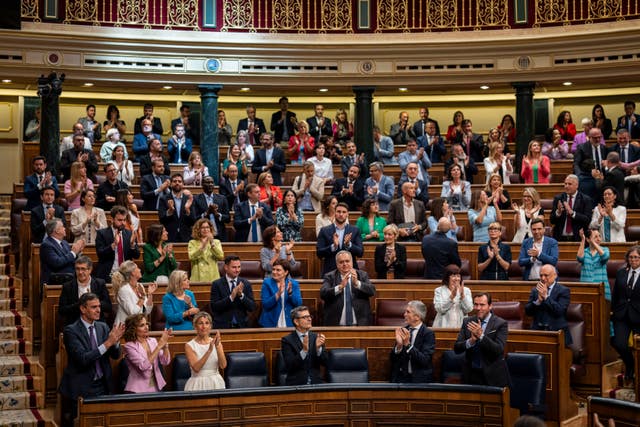
Spain’s Parliament has given final approval to a controversial amnesty law for hundreds of Catalan separatists involved in the illegal and unsuccessful 2017 secession bid.
The legislation was backed by Spain’s left-wing coalition government, two Catalan separatist parties, and other smaller parties. It passed by a vote of 177-172 in the lower house with the conservative Popular Party and far-right Vox opposing it.
The amnesty could benefit former Catalan regional president Carles Puigdemont, who is a fugitive from Spanish law in Belgium after fleeing his country following the failed October 2017 breakaway bid that he led.
It should also help out hundreds more, including former government officials in Barcelona, average citizens who participated in the secession attempt or protests, and some police officers involved in the crackdown on an illegal independence referendum held by Mr Puigdemont’s government.

The passing of the amnesty law, however, does not immediately clear up the legal mess of the separatists.
The law is likely to face legal challenges and will be reviewed by higher courts. It must also be applied by courts on a case-by-case basis. There are experts who question its constitutionality since they say it would create inequality between Spanish citizens by favouring some over others.
Since taking power in 2018, Spanish Prime Minister Pedro Sanchez has focused on reducing tensions in north-east Catalonia and he argues that the amnesty is key to culminating that process.
But the amnesty is also a political necessity for the premier, who agreed to the act of pardon when he needed the support of the separatist politicians in Madrid to form a new national government in November.
It was initially approved by the Parliament’s lower house in March. The Senate, where right-wing parties hold a majority, rejected it earlier this month, but the lower house can push it through regardless.

Tensions ran high in the chamber. The vote was by roll call with each politician standing up to vote verbally. An opposition politician shouted “Traitor!” at Mr Sanchez after he voted “yes”.
The parliamentary session had already taken a nasty turn during the debate when Socialist spokesman Artemi Rallo was interrupted by a Vox politician, who shouted out “Sell out” several times and called him “corrupt”.
“Europe, Spain and Catalonia have said ‘yes’ to the amnesty, even if you don’t like hearing it,” Mr Rallo shot back – referring to the endorsement of the amnesty law by the Council of Europe, a non-European Union institution that promotes human rights.
While the amnesty is popular in Catalonia, even among many unionists, the Popular Party and Vox have led protests against it in Madrid and other cities across the country. There have also been critics of the amnesty within Mr Sanchez’s Socialist party.
Popular Party leader Alberto Nunez Feijoo tried to shame the Socialists for granting the amnesty in exchange for “seven votes” of Mr Puigdemont’s party that it needed to stay in power.
He also warned Mr Sanchez that, once it is passed, he should expect few favours from the separatists, whose support is key to keeping his fragile government in power.
“This is an exchange of power for privileges and impunity,” he said.

It comes during the run-up to European Parliament elections on June 6-9 and as Mr Sanchez’s Socialists are trying to form a government in Catalonia after beating the separatists in regional elections earlier this month.
The parliamentary spokesmen for the Catalan separatist parties had no words of gratitude for Mr Sanchez. Instead, they praised their followers and former leaders who spent time in prison before the prime minister pardoned them and those who left the country like Mr Puigdemont.
“Today truly is a historic day. Today there is no forgiveness. Today a battle has been won in a conflict that has existed for centuries between two nations,” said Miriam Nogueras, of Mr Puigdemont’s Together party.
They also insisted that the next goal for the separatists will be to try to force Mr Sanchez to go back on his pledge to never grant them an authorised referendum on independence.
Gabriel Rufian, of the Republican Left of Catalonia, told politicians: “Next stop: referendum.”

Enjoy the convenience of having The Sunday Post delivered as a digital ePaper straight to your smartphone, tablet or computer.
Subscribe for only £5.49 a month and enjoy all the benefits of the printed paper as a digital replica.
Subscribe